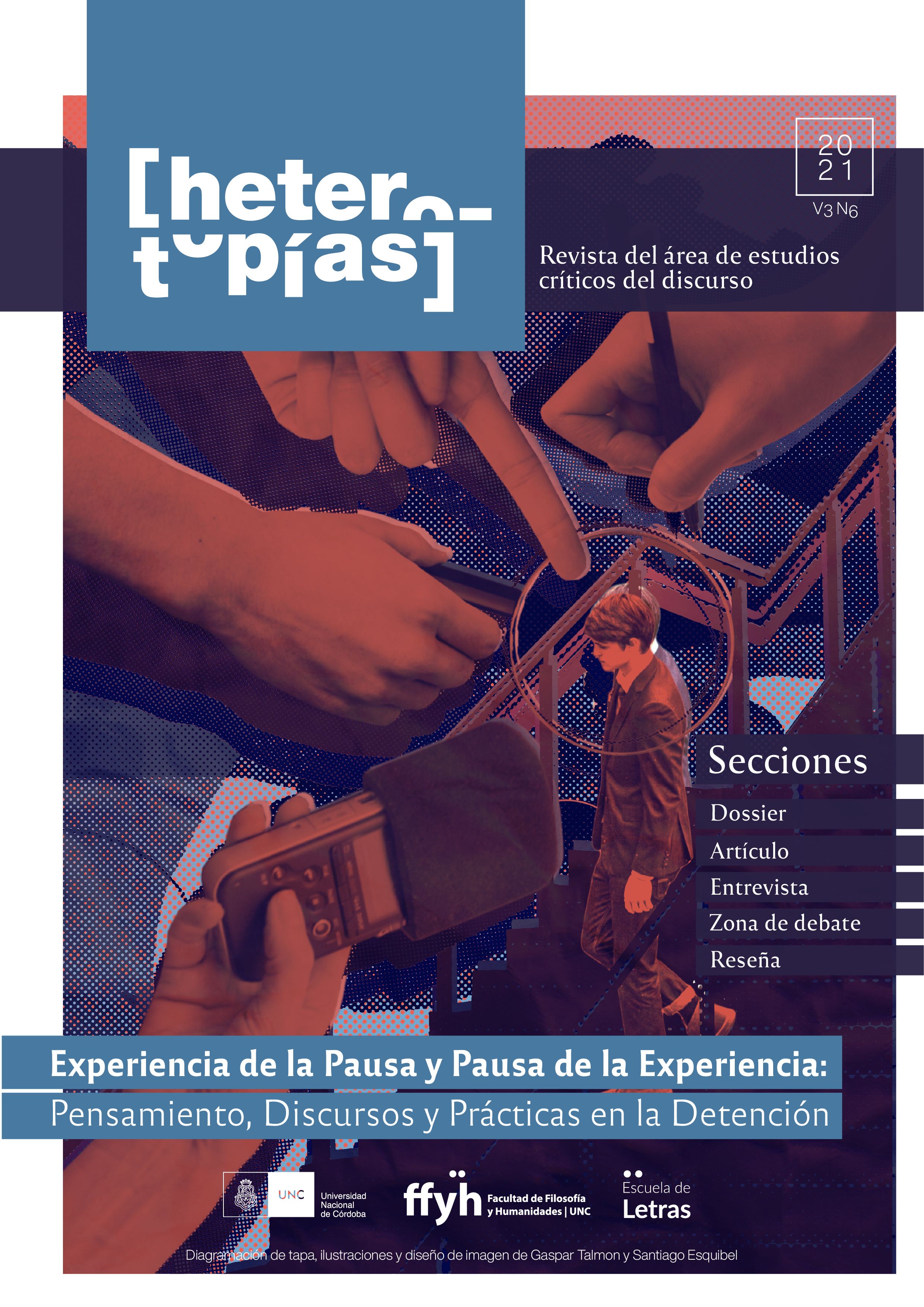Modernity: Delays
Main Article Content
Abstract
The text explores the power of delay in authors and works that appear, then, as limit attitudes (Foucault) in the critical narratives of modernity. Kafka, Borges, and Duchamp are among the authors featured in this suspended series that brings together, in its tense non-actuality, different but related temporalities. The reading is driven by Benjamin's proposition that the revolution must be considered, not as the progress of the train of history, but as an emergency brake.
Downloads
Article Details

This work is licensed under a Creative Commons Attribution-NonCommercial-ShareAlike 4.0 International License.
Those authors who have publications with this journal, accept the following terms: Those authors who have publications with this journal, accept the following terms:
a. The authors will keep their copyright and guarantee to the journal the right of first publication of their work, which will be simultaneously subject to the Creative Commons Attribution - Non-Commercial - Share Alike (by-nc-sa) Attribution License; no commercial use of the original work or any derivative works is allowed, the distribution of which must be done with a license equal to the one that regulates the original work.
b. Authors may adopt other non-exclusive license agreements for the distribution of the published version of the work (e.g., deposit it in an institutional telematic archive or publish it in a monographic volume) provided that the initial publication in this journal is indicated.
c. Authors are allowed and recommended to disseminate their work through the Internet (e.g. in institutional telematic archives or on their website) before and during the submission process, which may lead to interesting exchanges and increase the number of citations of the published work. (See The effect of open access).
How to Cite
References
Bibliografia
Antelo, Raúl. (2010). Maria com Marcel: Duchamp nos trópicos. Belo Horizonte: Editora da UFMG.
Benjamin, Walter. (1994). Magia e Técnica, Arte e Política:ensaios sobre literatura e história da cultura(Obras escolhidas v. 1).7 ed. Trad. Sergio Paulo Rouanet. São Paulo: Brasiliense.
Benjamin, Walter. (2009). Passagens. Org. WilliBolle. Trad. do alemão Irene Aron; trad. do francês Cleonice Paes Barreto Mourão. Belo Horizonte: Editora UFMG; São Paulo: Imprensa Oficial do Estado de São Paulo.
Blanchot, Maurice. (1990). La escritura del desastre. Trad. Pierre de Place. Caracas: Monte Avila Editores.
Blanchot, Maurice. (1997). A leitura de Kafka. InA parte do fogo (pp. 9-18). Trad. Ana Maria Scherer. Rio de Janeiro: Rocco.
Borges, Jorge Luis. (1974). Obras completas (1923-1972). Buenos Aires: Emecé Editores.
Didi-Huberman, Georges. (2018). “Olhos livres da história”, Ícone, Recife, v. 16, n. 2, 161-172.
Disponível em: https://periodicos.ufpe.br/revistas/icone/article/view/238900/pdf
Doane, Mary Ann. (2002). The emergence of cinematic time: modernity, contingency, the archive. Cambridge: Harvard University Press.
Duchamp, Marcel. (1975). The essential writings of Marcel Duchamp. Edited by Michel Sanouillet and Elmer Peterson.London: Thamesand Hudson.
Foucault, Michel. (1987). Vigiar e punir: nascimento da prisão [1975]. Trad. Raquel Ramalhete. Petrópolis: Vozes.
Foucault, Michel. (2002). A verdade e as formas jurídicas [1973]. Trad. Roberto Cabral de Melo Machado e Eduardo Jardim Morais. Rio de Janeiro: NAU Editora.
Foucault, Michel. (2005). O que são as luzes? [1984] In MOTTA, Manuel Barros da (Org.). Arqueologia das ciências e história dos sistemas de pensamento(pp. 335-351). Rio de Janeiro: Forense Universitária.
Frye, Northrop. (1999). Sobre Shakespeare. Org. Robert Sandler. Trad. Simone Lopes Neto. São Paulo: EDUSP.
Freud, Sigmund. (2010).O inconsciente. InObras Completas Volume 12: Introdução ao Narcisismo, Ensaios de metapsicologia e outros textos (1914-1916) (pp. 74-112). Tradução de Paulo César de Souza. São Paulo: Companhia das Letras.
Gagnebin, Jeanne Marie. (2013). História e narração em Walter Benjamin. São Paulo: Perspectiva.
Giorgi, Artur de Vargas. (jun. 2020). Demorar: notas sobre a emergência.Revista Landa, A queda do céunas artes e na literatura, Florianópolis, 8 (2), 11-21. Disponível em: http://www.revistalanda.ufsc.br/vol-8-n2-2019/
Kafka, Franz. (1994). Um médico rural[1919]. Trad. Modesto Carone. 3 ed. São Paulo: Brasiliense.
Krenak, Ailton. (2019). Ideias para adiar o fim do mundo. São Paulo: Companhia das Letras.
Löwy, Michael. (2005). Walter Benjamin: aviso de incêndio. Uma leitura das teses “Sobre o conceito de história”. Trad. Wanda Nogueira Caldeira Brant. São Paulo: Boitempo.
Ouspensky, P. D. (2004). TertiumOrganum: el tercer canon del pensamiento: una clave para los enigmas del mundo [1912]. Trad. Nicholas Bessaroboff y Claude Bragdon. Buenos Aires: Kier.
Paz, Octavio.(1977). Marcel Duchamp ou o castelo da pureza. Trad. Sebastião Uchoa Leite. São Paulo: Perspectiva.
Speranza, Graciela. (2010). Out of Field (Fuera de campo). Marcel Duchamp in Buenos Aires. Journal of Surrealism and the Americas, Arizona, v. 4, n. 1, pp. 1-14.Disponível em: https://repository.asu.edu/items/17413#embed
Shakespeare, William. (1969). Hamlet, Príncipe da Dinamarca. InObra Completa (vol. I) (pp. 529-619). Trad. F. Carlos de Almeida Cunha Medeiros e Oscar Mendes. Rio de Janeiro: José Aguilar.
Sófocles. (1976). Édipo Rei. Trad. Geir Campos. São Paulo: Abril.
Tomkins, Calvin.(2014). Duchamp: a biography. New York: MoMA.
Vélez-Escallón,Bairon Oswaldo. (2015). Borges 4D. Variaciones Borges, Pittsburgh, v. 40, pp. 115-132.
Vernant, Jean-Pierre; VIDAL-NAQUET, Pierre.(2014). Mito e tragédia na Grécia antiga. São Paulo: Perspectiva.
